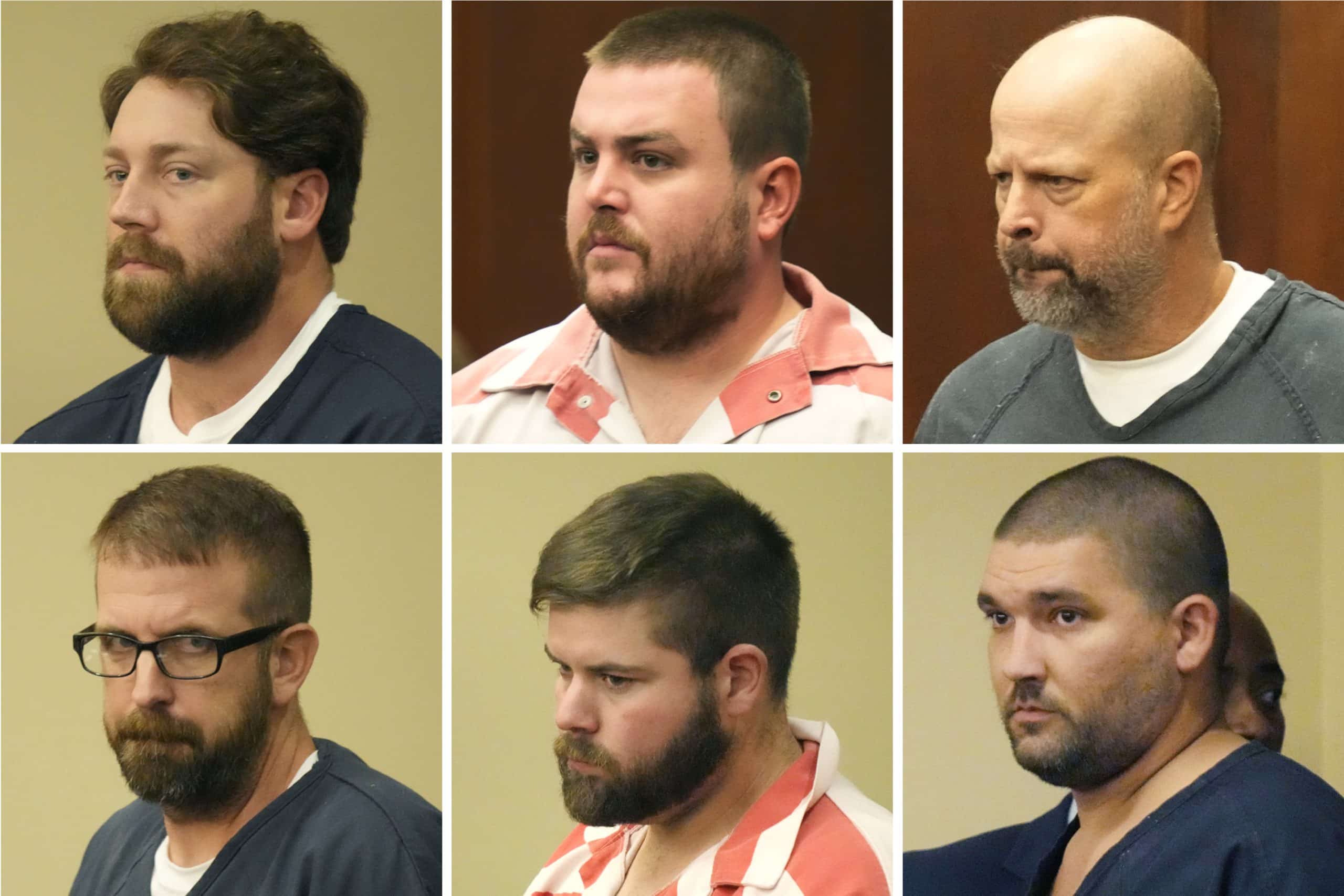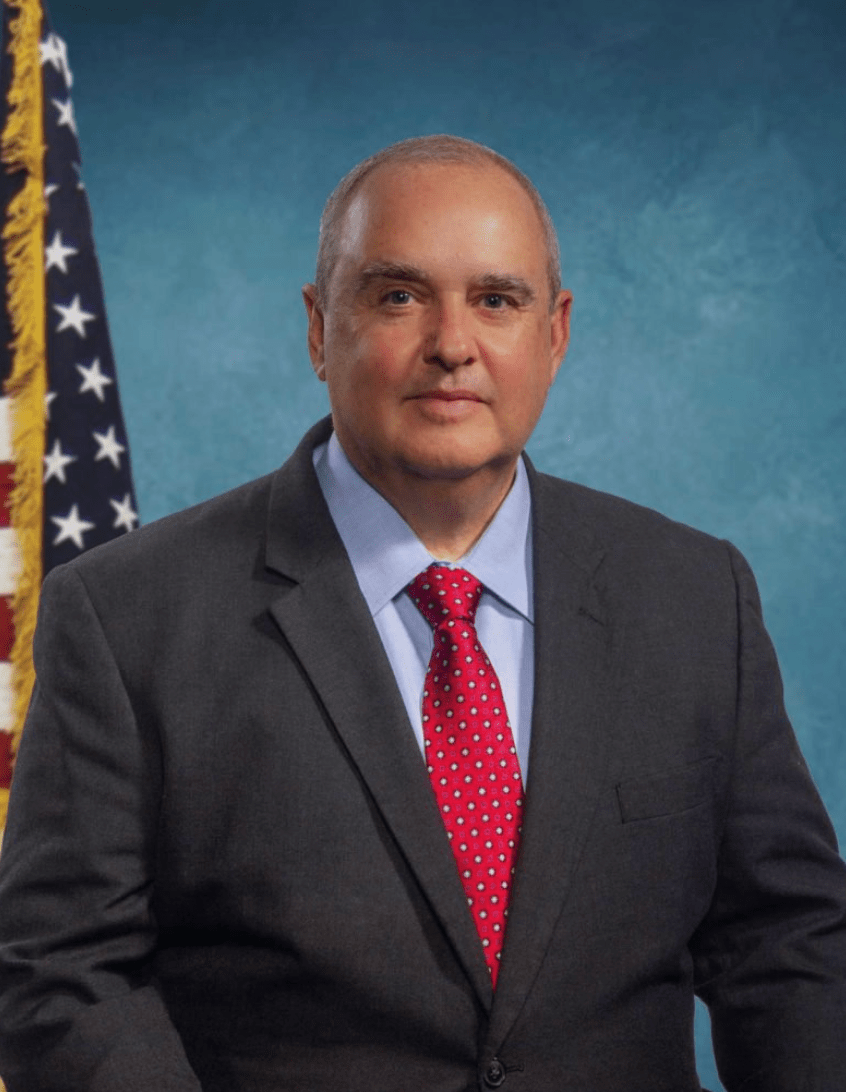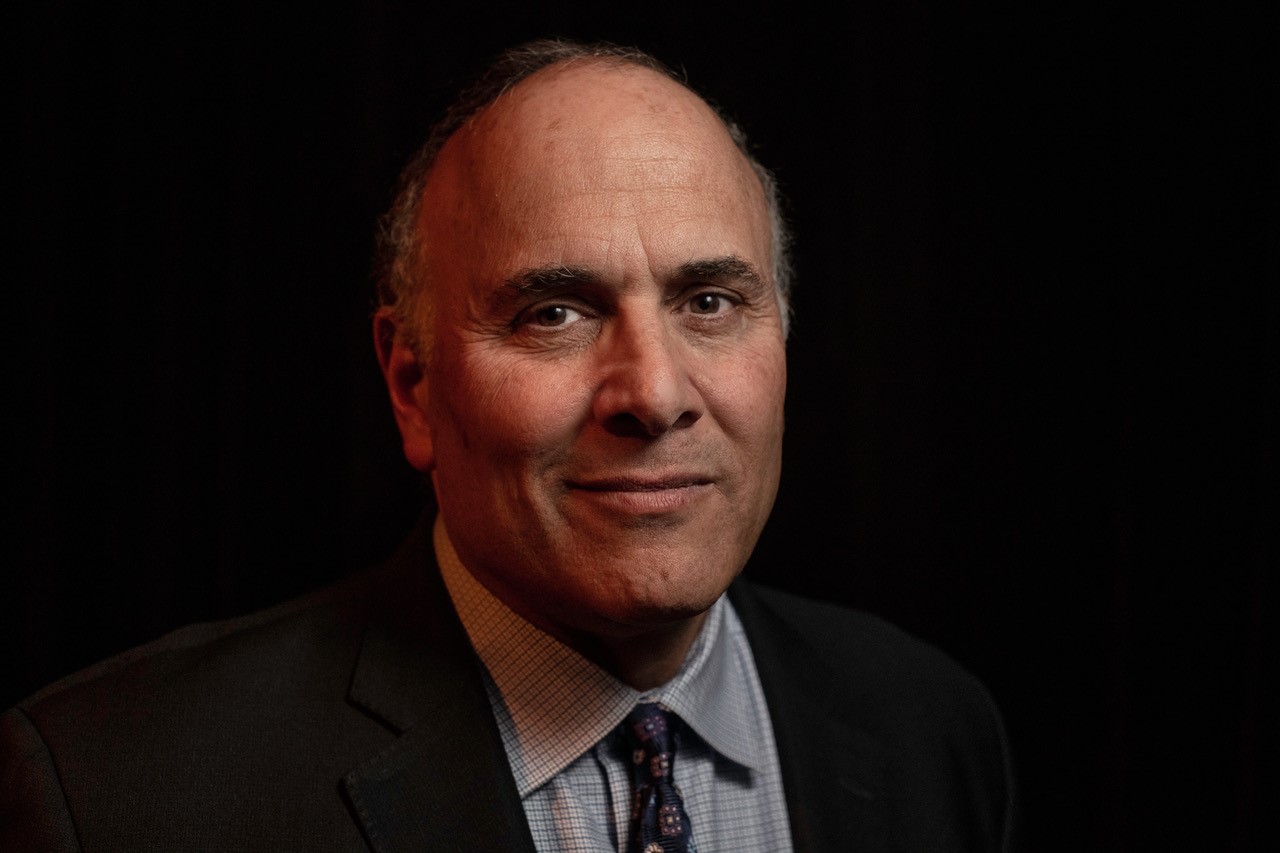Mississippi Today
Rankin County DA reviewing ‘Goon Squad’ cases. Legal experts say that’s not enough.

Rankin County District Attorney Bubba Bramlett confirmed that his office is reviewing criminal cases involving Rankin County’s “Goon Squad,” but he won’t divulge details, including how many cases have been dismissed and how far back his review will go.
In August, five deputies for the Rankin County Sheriff’s Department and a Richland police officer pleaded guilty to state and federal charges in a “Goon Squad” operation. Seven months earlier, they broke into a house without a warrant, tortured two Black men, Michael Corey Jenkins and Eddie Terrell Parker, threatened to use a sex toy on them and shoved a gun in Jenkins’ mouth and shot him. To conceal their crimes, they destroyed surveillance footage, planted false evidence and lied to investigators.
What these six officers did “violated the public trust and shook the foundation of our justice system,” Bramlett told Mississippi Today in a statement.
After learning of these crimes, “my office immediately conducted an extensive review to identify any and all cases in which these officers were involved,” he said. “We then reviewed each of those identified cases to determine if their testimony would be essential in the prosecution of that case.

“As a result, my office moved to dismiss those indicted cases and declined those cases which were not yet indicted, wherein the integrity of the investigation may have been compromised. This is an ongoing process in which we will continue to review and identify cases involving those officers and act accordingly.”
An investigation by the Mississippi Center for Investigative Reporting at Mississippi Today and The New York Times uncovered allegations that torture, coerced statements and false incident reports involving these six officers and more than a dozen others may stretch back two decades. Some of those interviewed alleged that deputies also planted evidence and filed false charges against them.
On March 19-21, five former Rankin County deputies and one former Richland police officer are slated to be sentenced in federal court for their roles in the torture of Jenkins and Parker.
When Mississippi Today asked the district attorney how many cases have been dismissed so far, whose charges were dismissed and how far back prosecutors plan to go in examining cases, he declined to answer those questions.
Since last August, prosecutors have asked judges to dismiss 25 drug indictments in Rankin County Circuit Court.
Seven dismissals don’t appear connected to Goon Squad actions. In two cases, co-defendants took the blame for crimes. In another two, defendants died. In three cases, indictments were dismissed because defendants pleaded guilty in other cases or because of speedy trial issues.
One dismissal cited the involvement of a Goon Squad member: “The State has learned that former Rankin County Deputy Christian Dedmon’s involvement in this case would make a prosecution of this matter untenable.”
One mentions the unavailability of an essential witness, and another cites new evidence. One dismissal discusses “the discovery of facts that make a prosecution of this matter untenable.”
In the dismissal of 14 indictments, prosecutors gave no reason other than it was in “the interest of justice.”

Steven Drizin, co-director of the Center on Wrongful Convictions at Northwestern University School of Law, said a systematic review must take place of all cases involving these officers.
“It will be painful because it may require that many convictions are vacated, and many old wounds of victims will be reopened,” he said, “but it is necessary to restore the public’s faith in law enforcement and, in many instances, the district attorney’s office who relied on these officers for years and may have ignored warning signs.”
Drizin said the problem with prosecutors reviewing these cases is they “will have to judge some of their own colleagues and police officers who they may have worked with. Any review that they do will be subject to bias.”
Matt Steffey, professor of law at the Mississippi College School of Law, questioned why the district attorney limited his review to whether Goon Squad officers’ testimony was essential when these same officers have admitted they planted false evidence on innocent people.
He recommended that someone “do the tough work of looking at all cases” and that whoever does it, there must be transparency. Declining to say how far back prosecutors plan to go in looking at cases “is certainly not transparent,” he said.

He noted that a review by prosecutors could be questioned because of potential conflicts. The sheriff’s daughter, Alexis Bailey Smith, works as an administrative assistant-paralegal in the district attorney’s office and earns $56,000 a year, according to the minutes of the Rankin County Board of Supervisors.
Steffey said Mississippi could model its approach after other states that have done systematic reviews.
In Chicago, a police detective and commander named Jon Graham Burge led a group of police known as the “Midnight Crew” and “Burge’s Ass-Kickers.” These detectives tortured more than 120 people, most of them Black men, between 1972 and 1991. The officers squeezed genitals, shoved guns in people’s mouths, beat them, suffocated them with plastic bags, burned them with cigarette lighters and used electrical shocks through a device Burge dubbed the “n—– box” to force false confessions.
In 1993, a decade after allegations of torture began to be exposed, Chicago police fired Burge, but it wasn’t until 2002 that a special prosecutor began to examine these allegations.
He conducted a four-year investigation that concluded these officers had likely committed torture but that their crimes couldn’t be prosecuted because they fell outside the statute of limitations.
Afterward, the governor stepped up and pardoned four of Burge’s victims, all of them on death row, after concluding they were innocent. Concluding the death penalty system was “fraught with error,” he also commuted the death sentences of the 167 others to life sentences.
In 2010, Burge was finally convicted of obstruction of justice and perjury and sentenced to more than four years in federal prison.
“The freedom that we treasure most of all in this country is the right to live free of governmental abuse of power,” U.S. District Judge Joan Humphrey Lefkow told him. “When a confession is coerced, the truth of the confession is called into question. When this becomes widespread …, the administration of justice is undermined irreparably. How can one trust that justice will be served when the justice system has been so defiled?”
In the wake of these revelations, the state of Illinois established a Torture Inquiry and Relief Commission for victims. So far, 211 people have filed claims.
Lawyers say a full review of Rankin County cases is needed. “It’s very clear there have been an untold number of convictions that were substantially procured through fraud, coercion or the planting of false evidence, which all these guys admitted to on some level,” said civil rights lawyer Trent Walker, who represents Jenkins and Parker.
Defense lawyer John Colette, who has represented many clients in Rankin County, said every case the Goon Squad members worked on could be called into question and that “an independent review” is needed to “ensure integrity.”
State Public Defender Andre de Gruy said to address this, the Legislature could provide extra funding to the Capital Post-Conviction Counsel to hire some temporary lawyers and investigators “to accept requests for case review from anyone convicted in Rankin County during the period.”
If lawyers reviewing each case found a basis for a post-conviction relief motion, they could file it, he said.
Senate Appropriations Chairman Briggs Hopson said he hasn’t talked to de Gruy about this idea, but his off-the-cuff reaction is that the U.S. attorney’s office or the Mississippi attorney general’s office would handle such claims.
If wrongful convictions are proven, people are entitled to back pay, he said.. State law provides $50,000 for each year of wrongful incarceration with a ceiling of $500,000.
Tucker Carrington, executive director of the Mississippi Innocence Project, called on state officials to review all the cases involving any member of the “Goon Squad.”
After Innocence Project officials uncovered evidence that two men had been wrongly convicted of murder because of the testimony of bite expert Michael West and pathologist Dr. Steven Hayne, Carrington said then-Attorney General Jim Hood promised to review all of their cases.
But that never happened, he said, and the courts are still dealing with those cases, some of which have been overturned.
As a part of their cooperation with authorities, Goon Squad members should be required to tell all of the cases they “messed around with,” Carrington said. “It should be like these serial killers, who have to tell everything they did.”
J. Cliff Johnson, director of the University of Mississippi’s MacArthur Justice Center, said the state could follow the lead of Illinois in creating an independent commission, made up of those in law enforcement, the judiciary and the community, to examine these cases.
“When you have widely known and outrageous acts by officers over a 20-year period of time, you have a duty to the victims to right their wrongs,” he said. “The other obligation is to the community. An important part of that is to be absolutely transparent in providing a remedy so that the public can once again trust the process.”
Any efforts undertaken must recognize the injustice of what happened, identify victims and provide remedies, he said, because “our system already struggles with credibility and respect.”
Brian Howey and Nate Rosenfield contributed to this report. This article was supported in part by a grant from the Pulitzer Center.
This article first appeared on Mississippi Today and is republished here under a Creative Commons license.![]()
Mississippi Today
Mississippi Legislature approves DEI ban after heated debate
Mississippi lawmakers have reached an agreement to ban diversity, equity and inclusion programs and a list of “divisive concepts” from public schools across the state education system, following the lead of numerous other Republican-controlled states and President Donald Trump’s administration.
House and Senate lawmakers approved a compromise bill in votes on Tuesday and Wednesday. It will likely head to Republican Gov. Tate Reeves for his signature after it clears a procedural motion.
The agreement between the Republican-dominated chambers followed hours of heated debate in which Democrats, almost all of whom are Black, excoriated the legislation as a setback in the long struggle to make Mississippi a fairer place for minorities. They also said the bill could bog universities down with costly legal fights and erode academic freedom.
Democratic Rep. Bryant Clark, who seldom addresses the entire House chamber from the podium during debates, rose to speak out against the bill on Tuesday. He is the son of the late Robert Clark, the first Black Mississippian elected to the state Legislature since the 1800s and the first Black Mississippian to serve as speaker pro tempore and preside over the House chamber since Reconstruction.
“We are better than this, and all of you know that we don’t need this with Mississippi history,” Clark said. “We should be the ones that say, ‘listen, we may be from Mississippi, we may have a dark past, but you know what, we’re going to be the first to stand up this time and say there is nothing wrong with DEI.'”
Legislative Republicans argued that the measure — which will apply to all public schools from the K-12 level through universities — will elevate merit in education and remove a list of so-called “divisive concepts” from academic settings. More broadly, conservative critics of DEI say the programs divide people into categories of victims and oppressors and infuse left-wing ideology into campus life.
“We are a diverse state. Nowhere in here are we trying to wipe that out,” said Republican Sen. Tyler McCaughn, one of the bill’s authors. “We’re just trying to change the focus back to that of excellence.”
The House and Senate initially passed proposals that differed in who they would impact, what activities they would regulate and how they aim to reshape the inner workings of the state’s education system. Some House leaders wanted the bill to be “semi-vague” in its language and wanted to create a process for withholding state funds based on complaints that almost anyone could lodge. The Senate wanted to pair a DEI ban with a task force to study inefficiencies in the higher education system, a provision the upper chamber later agreed to scrap.
The concepts that will be rooted out from curricula include the idea that gender identity can be a “subjective sense of self, disconnected from biological reality.” The move reflects another effort to align with the Trump administration, which has declared via executive order that there are only two sexes.
The House and Senate disagreed on how to enforce the measure but ultimately settled on an agreement that would empower students, parents of minor students, faculty members and contractors to sue schools for violating the law.
People could only sue after they go through an internal campus review process and a 25-day period when schools could fix the alleged violation. Republican Rep. Joey Hood, one of the House negotiators, said that was a compromise between the chambers. The House wanted to make it possible for almost anyone to file lawsuits over the DEI ban, while Senate negotiators initially bristled at the idea of fast-tracking internal campus disputes to the legal system.
The House ultimately held firm in its position to create a private cause of action, or the right to sue, but it agreed to give schools the ability to conduct an investigative process and potentially resolve the alleged violation before letting people sue in chancery courts.
“You have to go through the administrative process,” said Republican Sen. Nicole Boyd, one of the bill’s lead authors. “Because the whole idea is that, if there is a violation, the school needs to cure the violation. That’s what the purpose is. It’s not to create litigation, it’s to cure violations.”
If people disagree with the findings from that process, they could also ask the attorney general’s office to sue on their behalf.
Under the new law, Mississippi could withhold state funds from schools that don’t comply. Schools would be required to compile reports on all complaints filed in response to the new law.
Trump promised in his 2024 campaign to eliminate DEI in the federal government. One of the first executive orders he signed did that. Some Mississippi lawmakers introduced bills in the 2024 session to restrict DEI, but the proposals never made it out of committee. With the national headwinds at their backs and several other laws in Republican-led states to use as models, Mississippi lawmakers made plans to introduce anti-DEI legislation.
The policy debate also unfolded amid the early stages of a potential Republican primary matchup in the 2027 governor’s race between State Auditor Shad White and Lt. Gov. Delbert Hosemann. White, who has been one of the state’s loudest advocates for banning DEI, had branded Hosemann in the months before the 2025 session “DEI Delbert,” claiming the Senate leader has stood in the way of DEI restrictions passing the Legislature.
During the first Senate floor debate over the chamber’s DEI legislation during this year’s legislative session, Hosemann seemed to be conscious of these political attacks. He walked over to staff members and asked how many people were watching the debate live on YouTube.
As the DEI debate cleared one of its final hurdles Wednesday afternoon, the House and Senate remained at loggerheads over the state budget amid Republican infighting. It appeared likely the Legislature would end its session Wednesday or Thursday without passing a $7 billion budget to fund state agencies, potentially threatening a government shutdown.
“It is my understanding that we don’t have a budget and will likely leave here without a budget. But this piece of legislation …which I don’t think remedies any of Mississippi’s issues, this has become one of the top priorities that we had to get done,” said Democratic Sen. Rod Hickman. “I just want to say, if we put that much work into everything else we did, Mississippi might be a much better place.”
This article first appeared on Mississippi Today and is republished here under a Creative Commons license.
Mississippi Today
House gives Senate 5 p.m. deadline to come to table, or legislative session ends with no state budget
The House on Wednesday attempted one final time to revive negotiations between it and the Senate over passing a state budget.
Otherwise, the two Republican-led chambers will likely end their session without funding government services for the next fiscal year and potentially jeopardize state agencies.
The House on Wednesday unanimously passed a measure to extend the legislative session and revive budget bills that had died on legislative deadlines last weekend.
House Speaker Jason White said he did not have any prior commitment that the Senate would agree to the proposal, but he wanted to extend one last offer to pass the budget. White, a Republican from West, said if he did not hear from the Senate by 5 p.m. on Wednesday, his chamber would end its regular session.
“The ball is in their court,” White said of the Senate. “Every indication has been that they would not agree to extend the deadlines for purposes of doing the budget. I don’t know why that is. We did it last year, and we’ve done it most years.”
But it did not appear likely Wednesday afternoon that the Senate would comply.
The Mississippi Legislature has not left Jackson without setting at least most of the state budget since 2009, when then Gov. Haley Barbour had to force them back to set one to avoid a government shutdown.
The House measure to extend the session is now before the Senate for consideration. To pass, it would require a two-thirds majority vote of senators. But that might prove impossible. Numerous senators on both sides of the aisle vowed to vote against extending the current session, and Lt. Gov. Delbert Hosemann who oversees the chamber said such an extension likely couldn’t pass.
Senate leadership seemed surprised at the news that the House passed the resolution to negotiate a budget, and several senators earlier on Wednesday made passing references to ending the session without passing a budget.
“We’ll look at it after it passes the full House,” Senate President Pro Tempore Dean Kirby said.
The House and Senate, each having a Republican supermajority, have fought over many issues since the legislative session began early January.
But the battle over a tax overhaul plan, including elimination of the state individual income tax, appeared to cause a major rift. Lawmakers did pass a tax overhaul, which the governor has signed into law, but Senate leaders cried foul over how it passed, with the House seizing on typos in the Senate’s proposal that accidentally resembled the House’s more aggressive elimination plan.
The Senate had urged caution in eliminating the income tax, and had economic growth triggers that would have likely phased in the elimination over many years. But the typos essentially negated the triggers, and the House and governor ran with it.
The two chambers have also recently fought over the budget. White said he communicated directly with Senate leaders that the House would stand firm on not passing a budget late in the session.
But Senate leaders said they had trouble getting the House to meet with them to haggle out the final budget.
On the normally scheduled “conference weekend” with a deadline to agree to a budget last Saturday, the House did not show, taking the weekend off. This angered Hosemann and the Senate. All the budget bills died, requiring a vote to extend the session, or the governor forcing them into a special session.
If the Legislature ends its regular session without adopting a budget, the only option to fund state agencies before their budgets expire on June 30 is for Gov. Tate Reeves to call lawmakers back into a special session later.
“There really isn’t any other option (than the governor calling a special session),” Lt. Gov. Delbert Hosemann previously said.
If Reeves calls a special session, he gets to set the Legislature’s agenda. A special session call gives an otherwise constitutionally weak Mississippi governor more power over the Legislature.
This article first appeared on Mississippi Today and is republished here under a Creative Commons license.
Mississippi Today
Amount of federal cuts to health agencies doubles
Cuts to public health and mental health funding in Mississippi have doubled – reaching approximately $238 million – since initial estimates last week, when cancellations to federal grants allocated for COVID-19 pandemic relief were first announced.
Slashed funding to the state’s health department will impact community health workers, planned improvements to the public health laboratory, the agency’s ability to provide COVID-19 vaccinations and preparedness efforts for emerging pathogens, like H5 bird flu.
The grant cancellations, which total $230 million, will not be catastrophic for the agency, State Health Officer Dr. Daniel Edney told members of the Mississippi House Democratic Caucus at the Capitol April 1.
But they will set back the agency, which is still working to recover after the COVID-19 pandemic decimated its workforce and exposed “serious deficiencies” in the agency’s data collection and management systems.
The cuts will have a more significant impact on the state’s economy and agency subgrantees, who carry out public health work on the ground with health department grants, he said.
“The agency is okay. But I’m very worried about all of our partners all over the state,” Edney told lawmakers.
The health department was forced to lay off 17 contract workers as a result of the grant cancellations, though Edney said he aims to rehire them under new contracts.
Other positions funded by health department grants are in jeopardy. Two community health workers at Back Bay Mission, a nonprofit that supports people living in poverty in Biloxi, were laid off as a result of the cuts, according to WLOX. It’s unclear how many more community health workers, who educate and help people access health care, have been impacted statewide.
The department was in the process of purchasing a comprehensive data management system before the cuts and has lost the ability to invest in the Mississippi Public Health Laboratory, he said. The laboratory performs environmental and clinical testing services that aid in the prevention and control of disease.
The agency has worked to reduce its dependence on federal funds, Edney said, which will help it weather the storm. Sixty-six percent of the department’s budget is federally funded.
The Centers for Disease Control and Prevention pulled back $11.4 billion in funding to state health departments nationwide last week. The funding was originally allocated by Congress for testing and vaccination against the coronavirus as part of COVID-19 relief legislation, and to address health disparities in high-risk and underserved populations. An additional $1 billion from the Substance Abuse and Mental Health Services Administration was also terminated.
“The COVID-19 pandemic is over, and HHS will no longer waste billions of taxpayer dollars responding to a non-existent pandemic that Americans moved on from years ago,” the Department of Health and Human Services Director of Communications Andrew Nixon said in a statement.
HHS did not respond to questions from Mississippi Today about the cuts in Mississippi.
Democratic attorneys general and governors in 23 states filed a lawsuit against the U.S. Department of Health and Human Services Tuesday, arguing that the sudden cancellation of the funding was unlawful and seeking injunctive relief to halt the cuts. Mississippi did not join the suit.
Mental health cuts
The Department of Mental Health received about $7.5 million in cuts to federal grants from the Substance Abuse and Mental Health Services Administration.

Over half of the cuts were to community mental health centers, and supported alcohol and drug treatment services for people who can not afford treatment, housing services for parenting and pregnant women and their children, and prevention services.
The cuts could result in reduced beds at community mental health centers, Phaedre Cole, the director of Life Help and President of Mississippi Association of Community Mental Health Centers, told lawmakers April 1.
Community mental health centers in Mississippi are already struggling to keep their doors open. Four centers in the state have closed since 2012, and a third have an imminent to high risk of closure, Cole told legislators at a hearing last December.
“We are facing a financial crisis that threatens our ability to maintain our mission,” she said Dec. 5.
Cuts to the department will also impact diversion coordinators, who are charged with reducing recidivism of people with serious mental illness to the state’s mental health hospital, a program for first-episode psychosis, youth mental health court funding, school-aged mental health programs and suicide response programs.
The Department of Mental Health hopes to reallocate existing funding from alcohol tax revenue and federal block grant funding to discontinued programs.
The agency posted a list of all the services that have received funding cuts. The State Department of Health plans to post such a list, said spokesperson Greg Flynn.
Health leaders have expressed fear that there could be more funding cuts coming.
“My concern is that this is the beginning and not the end,” said Edney.
This article first appeared on Mississippi Today and is republished here under a Creative Commons license.![]()
-

 Mississippi Today22 hours ago
Mississippi Today22 hours agoPharmacy benefit manager reform likely dead
-

 News from the South - Alabama News Feed6 days ago
News from the South - Alabama News Feed6 days agoSevere storms will impact Alabama this weekend. Damaging winds, hail, and a tornado threat are al…
-

 News from the South - Alabama News Feed5 days ago
News from the South - Alabama News Feed5 days agoUniversity of Alabama student detained by ICE moved to Louisiana
-

 News from the South - Oklahoma News Feed4 days ago
News from the South - Oklahoma News Feed4 days agoTornado watch, severe thunderstorm warnings issued for Oklahoma
-

 News from the South - West Virginia News Feed7 days ago
News from the South - West Virginia News Feed7 days agoRoane County Schools installing security film on windows to protect students
-

 News from the South - Virginia News Feed5 days ago
News from the South - Virginia News Feed5 days agoYoungkin removes Ellis, appoints Cuccinelli to UVa board | Virginia
-

 News from the South - Florida News Feed7 days ago
News from the South - Florida News Feed7 days agoPeanut farmer wants Florida water agency to swap forest land
-

 News from the South - West Virginia News Feed5 days ago
News from the South - West Virginia News Feed5 days agoHometown Hero | Restaurant owner serves up hope











































